West Sea Otter Water Taxi is a community-focused small business that’s having a major impact on Wuikinuxv Nation by making travel affordable and getting Wuikinuxv people out across their territories.
West Sea Otter Water Taxi: A Family-Run Small Business With a Big Community Impact
Estimated Reading time

29 Mins
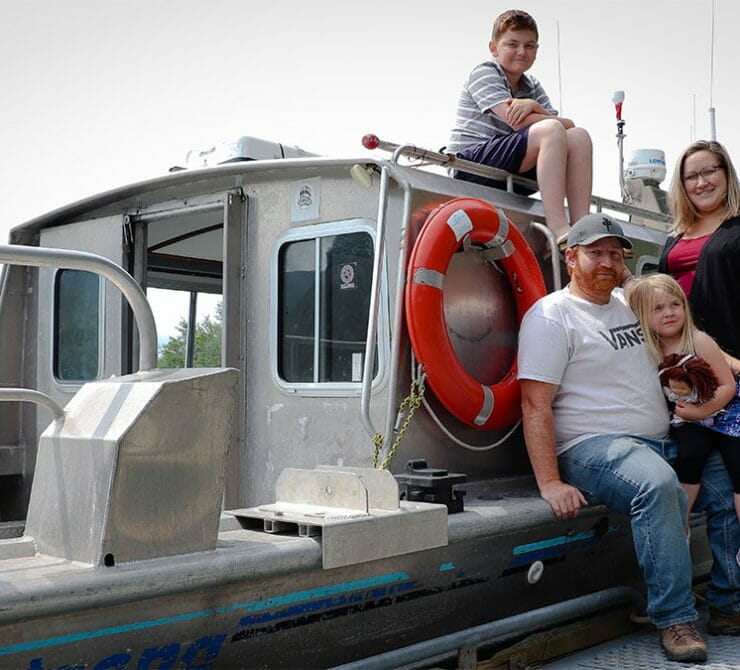
Rivers Inlet is the main community of Wuikinuxv Nation, located at the mouth of the Rivers Inlet fjord and adjacent the Waanukv River.
At a Glance
On the remote central coast—between the long, lush fjord of Rivers Inlet and the glacial green Waanukv River—lies the central community of Wuikinuxv Nation. It is here that Danielle Shaw and Chris “Archie” Corbett launched West Sea Otter Water Taxi—a small, community-focused business with a big impact.
After three years in operation, the business provides a wonderful example of how First Nations’ investments in small business start-ups benefit many in remote communities. Shaw and Corbett overcame the unique barriers faced by First Nations entrepreneurs to create a business that supports their own small family, while benefiting the larger community of Wuikinuxv by making travel affordable for families and helping get community members out on their territory.
Reclaiming Economic Determination After Colonization
Western archeologists have found settlements in the region dating back over 10,000 years, but the Wuikinuxv Nation have occupied their territory—which runs from Koeye River to Cranston Point, to the head of Wuikinuxv Lake—since time began.
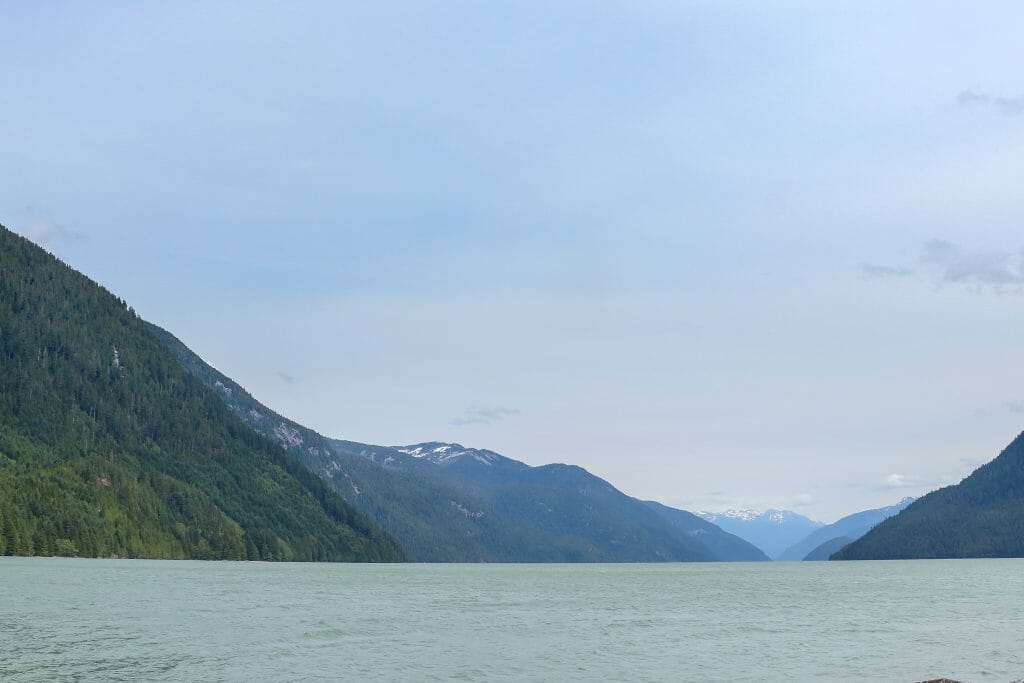
“Before the arrival of the Europeans, our people thrived, surrounded by an abundance of rich natural resources,” writes the author of We are the Wuikinuxv. Those resources included the abundant salmon stock that return each year to spawn in the many tributaries of Wuikinuxv Lake, and the towering western red cedar trees tied closely to the well-being of Wuikinuxv.
Colonization brought conflict, disease, and a new economic imperative—one based on outsiders’ focus on short-term exploitation rather than on long-term stewardship. Wuikinuxv Chief Joseph Chamberlain expressed his concern to the Royal Commission on Indian Affairs that the government was selling Wuikinuxv land to canneries and logging the trees of their territory. “The white men want to take all our land and we are in the position of men who have been pushed half way to the water off our land, and it would not take much to push us off the land into the deep water altogether.”
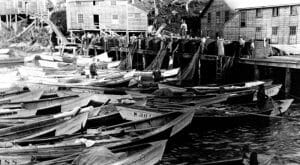
Despite Chief Chamberlain’s concerns, exploitation forged ahead and by the late 1800s, there were 16 canneries operating in Rivers Inlet and ancient trees were being logged at an unprecedented rate. The Wuikinuxv lifestyle that had previously revolved around hunting, gathering, preserving, and trading, became tied to logging and fishing. By the late 20th century, the once abundant resources of the territory had critically collapsed; by 1999, the local salmon stock had fallen to 0.1% of historic levels.
But Wuikinuxv Nation, along with other coastal First Nations, began reclaiming control of their economic future. They negotiated land use plans for their territory, as part of Coastal First Nations—Great Bear Initiative, and asserted recognition of Wuikinuxv Rights and Title to “create a quality of life that is consistent with Wuikinuxv traditional values and beliefs and responsibilities around stewardship.” As it pursues its inherent right to self-determination, Wuikinuxv Nation has committed to providing environmentally and socially sustainable employment opportunities.
Serving the Needs of a Remote Community
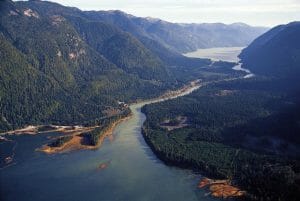
It is one of these opportunities that brought Danielle Shaw to Rivers Inlet. Shaw is a member of Wuikinuxv Nation, but grew up and attended school in the Lower Mainland. When a position opened up with the band office in Rivers Inlet, Shaw—along with her husband Archie Corbett—took the opportunity to return to the territory of her ancestors, and today she works as the Nation’s stewardship director.
Shaw soon discovered one of the key features of life in Rivers Inlet: isolation. There is no road access, no ferry service, and the closest large community is Port Hardy—nearly 150 kilometres away by boat. That distance makes many aspects of life more expensive and challenging —from grocery shopping, to repairing household appliances, to accessing regular healthcare. Before West Sea Otter, Shaw explains “People only had the option of flying in or barging in goods and groceries. That can get pretty expensive, especially on the plane.”
People only had the option of flying in or barging in goods and groceries. That can get pretty expensive, especially on the plane.
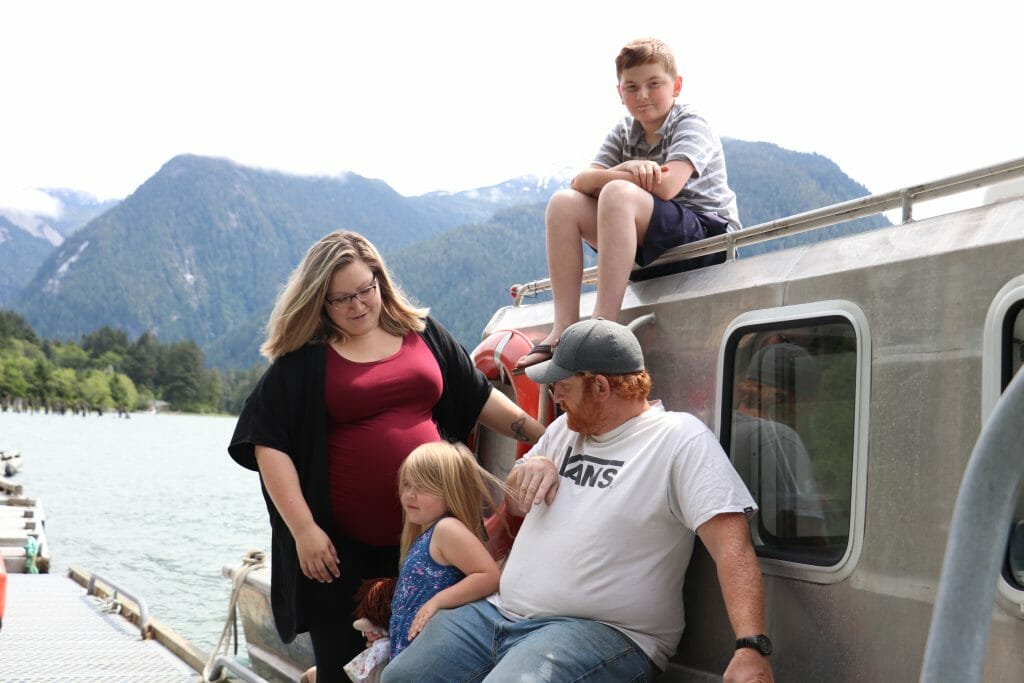
Recognizing the community’s need for additional transportation, Shaw and Corbett decided to launch a water taxi business. Shaw, who has a background in business administration, always saw herself owning and operating her own business. For years, she and Corbett had discussed what that business might look like, and eventually the pieces began to fall into place.
After a few years in Rivers Inlet, Corbett and Shaw had started a family and began to see the impacts of costly travel. “We [were] paying an arm and a leg for freight and realizing just how much it costs to get to and from the village—you can go on a family vacation for the same amount it costs to get to Port Hardy and back.”
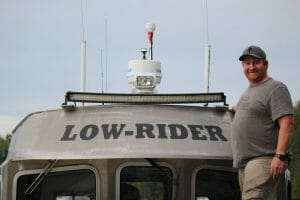
At one point, the couple were frequently chartering a plane and advertising locally for passengers and freight, realizing they could save money that way, rather than going through the scheduled flights. It wasn’t sustainable for their family, or for many of their fellow community members. “I saw a need and decided to take a look further into it,” says Shaw.
The idea of operating a water taxi sat well with Shaw’s husband Corbett, who grew up in Port Hardy and had spent most of his life on the water. “I had my own boat by the time I was 12,” he says. “I’ve just always been on the water.” Corbett spent years as a commercial fisherman, and when he and Shaw first moved to Rivers Inlet, Corbett was working as a Guardian Watchman for Wuikinuxv Nation (a member of the Coastal Stewardship Network). “He really missed being on the water,” says Shaw. “So it came to the point where we thought ‘Why don’t we get a boat and start a water taxi?’”
First Nations Entrepreneurs Facing Unique Barriers
Envisioning it was the first step, but Shaw had plenty of work ahead of her before the business could become operational. Though her education in business administration gave her a solid foundation of entrepreneurial skills, she still spent long hours perfecting her business plan. “I sat there with 18 tabs open on my browser—with components of a business plan, and how to write a business plan—piecing it all together, up till 3:00 am for weeks straight after work getting it all done,” she recalls.
But while Shaw’s education might have prepared her for late nights crafting business plans, it didn’t prepare her to overcome the many unique barriers placed in the way of First Nations entrepreneurs. “One of my biggest learning curves through this whole process is something that I never really thought about: the First Nations aspect of it,” recounts Shaw. “It’s a whole different ball game.”
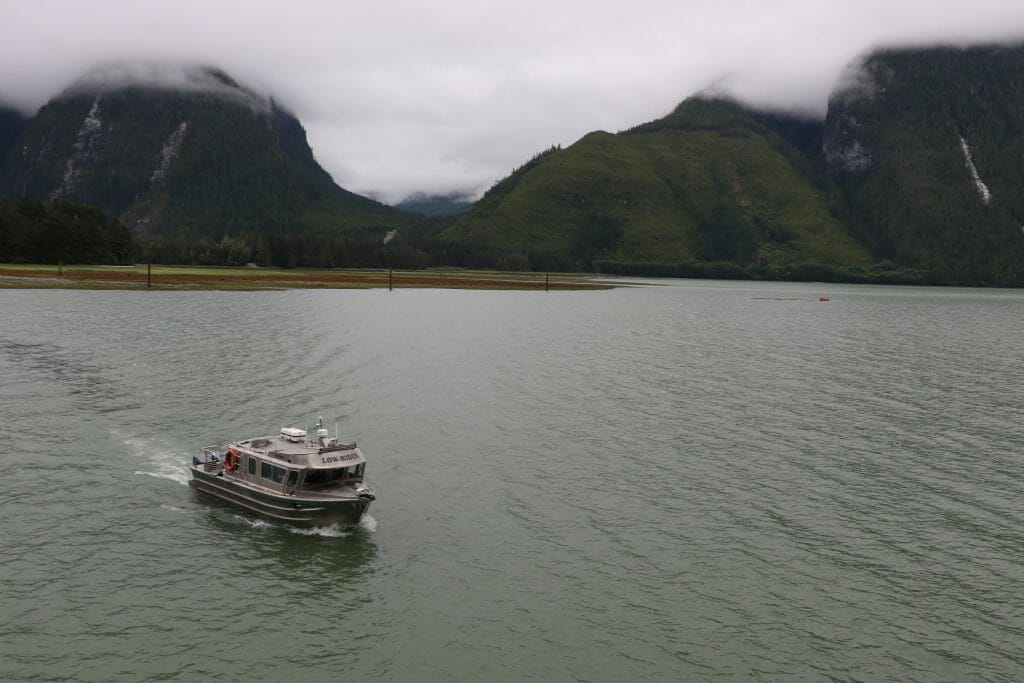
The process for acquiring funding illustrates Shaw’s experience. Shaw and Corbett worked closely with Coast Funds and the Wuikinuxv Nation to secure funding to purchase a boat and establish the water taxi business. But even before connecting with Coast Funds, they had been pre-approved for a loan based on their credit and income. “We were riding on that,” says Shaw.
But when Shaw and Corbett went back to the bank with their business plan, the boat they hoped to purchase, their down payment, and funding from Wuikinuxv’s allocation with Coast Funds, the bank denied them a loan that was 50 per cent smaller than the pre-approved amount. “We were kind of thrown off and baffled by it,” Shaw remembers.
They later learned the reason their loan was denied: vessels kept on a First Nations reserve can’t be used as collateral. “Ultimately, the woman we were dealing with wasn’t informed in the different ways to work with First Nations businesses,” says Shaw. “It got really frustrating because it felt like we’ve done everything right.” It took Shaw another year to find a lender to help them start their business.
Shaw says the experience proved valuable the next time they had to go through the same process. When Shaw and Corbett had to seek a second loan to add a third outboard motor to their boat, they knew how to work within the system. They applied to BDC—a federal lending program geared towards small business and entrepreneurship with an Aboriginal lending program—and were quickly approved.
Taxes are yet another area where First Nations small businesses, especially those operating on reserves, have to work with a set of unclear guidelines. “We have a really good accountant…but she’s still learning things,” says Shaw. “We’re still trying to navigate different things in terms of GST numbers, when to charge tax, when not to charge tax and everything like that.”
Shaw says she’s not surprised then that other First Nations people might be put off wanting to pursue small business opportunities. “If even the professionals don’t know the different policies, then it can be pretty daunting.”
Launching a Community-Focused Business
In 2017, Danielle Shaw and Archie Corbett officially launched their new business. West Sea Otter water taxi is a comfortable 12-passenger vessel, providing regular service between Rivers Inlet and Port Hardy, as well as charters within the surrounding area.
As Shaw and Corbett had predicted, the business was just what the community needed. Cerelina Willie is a Wuikinuxv member who was living in Rivers Inlet when West Sea Otter launched. “Everyone was so super excited about having access to a water taxi,” she remembers. “Especially a water taxi that was based out of the village.”
Everyone was so super excited about having access to a water taxi. Especially a water taxi that was based out of the village.
Willie explains that although there are other water taxis along the coast, the cost to charter their services rises significantly when a customer has to pay for the cost of getting the taxi to Rivers Inlet—before even factoring in the rest of the journey.
Shaw says one of their key goals in starting the business was to provide affordable options for travel and freight for people who live in Wuikinuxv, and they have been successful at that. “Our rates are competitive, but they’re also
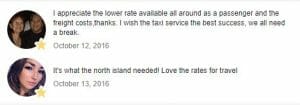
affordable,” she says, noting that they charge less than half what the airline charges for cargo.
By offering a reduced rate for children, Shaw and Corbett hoped to make it easier for families like Willie’s to travel from Rivers Inlet. Willie confirms the business has made a big impact for her family: “Myself, my husband, our two younger boys (and one adult son), all prefer to use the water taxi over the plane. I mean the plane is so expensive and the luggage allowance is half of what the water taxi’s is,” she exclaims. “But I also just enjoy being on the water.”
She’s not alone notes Shaw: “Being coastal people, a lot of the people feel more comfortable in the water than in the air.” Taking the water taxi is a great way for Wuikinuxv members to see more of their territory, Shaw and Corbett’s family included. “It has afforded us so many different opportunities to visit places along the coast that we haven’t been to before. It gets our kids out on the water and seeing different parts of the territory.”
It has afforded us so many different opportunities to visit places along the coast that we haven’t been to before. It gets our kids out on the water and seeing different parts of the territory.
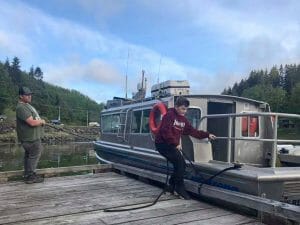
In fact, her favourite part of running the business is extending that same opportunity to Wuikinuxv youth. In recent years, the community lacked a boat with the required insurance to carry a large group of school-age children. With the launch of West Sea Otter, that has changed.
“Now there’s an option that can be supported, and is insured, legal, and available.” The school, youth programs, and the band often charter West Sea Otter to take local youth out fishing, to visit local lodges, or to go camping at significant cultural sites, like Clam Beach. “So just seeing the kids and people who don’t necessarily get on the territory lots be able to get [out there] and see different places is probably my favourite part of it,” says Shaw.
Willie says it’s clear that Shaw and Corbett operate their business in service of the community. As part of their freight service, Corbett will often pick up grocery orders for customers in Port Hardy—saving them a round trip journey, or the cost of paying the grocery store for delivery.
Corbett is well known for his friendly, easy-going manner, setting passengers at ease and doing what he can to make each trip an enjoyable journey. “If they’re travelling along and there are killer whales or humpback whales around, Archie will always stop and let us get pictures and enjoy the company,” says Willie.
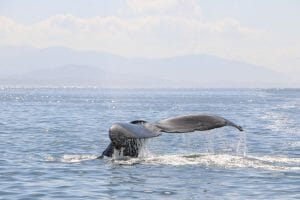
A less tangible benefit of operating the business is providing inspiration to others. Shaw hopes that by launching her business in the small community, she has encouraged others to pursue similar endeavours. “I think that there’s a lot of people along the coast, and in small communities, and in Wuikinuxv who have really great ideas, it’s just crossing that hurdle to actually doing it can be the most daunting part of it,” she says. “I think [West Sea Otter] helped open up people’s eyes to possibilities, that people can grow, can make their own business, and their own livelihood.”
Lessons Learned
Now in their third year of operation, Corbett and Shaw continue to find ways to grow and improve their business. Like any small business, there has been much to learn during the first few years, from finding financing to developing effective marketing techniques.
Finding Resources — Taking the Leap
Unsurprisingly, Shaw says one of the biggest challenges of starting her business was finding funding sources to purchase the boat and launch the business. Being able to work with Wuikinuxv Nation to access funding through Coast Funds helped, but ultimately, learning the ins and outs of what resources are available to First Nations entrepreneurs made a big difference.
Shaw had success working with BDC, a federal lending program, but also points other Indigenous entrepreneurs to potential sources like Community Futures and New Relationship Trust.
Shaw acknowledges that even after finding funding sources, the path forward can still seem daunting: hours of paperwork, negotiating, and proving your worth. But she encourages other would-be entrepreneurs to keep pushing forward. “Each little thing can look like a big hurdle, but just go for it and the worst that could happen is someone says no and then you move on.”
Marketing Through Word-of-Mouth
Marketing was always a key part of Shaw’s business plan. She operates a Facebook account and a website for West Sea Otter, but says a big part of her business’s success comes from word-of-mouth marketing.
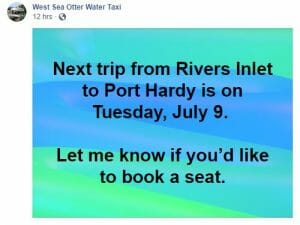
It’s one of the benefits of operating in a small community: people talk. Shaw and Corbett do their best to provide good service and often recommendations will come from previous customers. Shaw also has relationships with the fishing lodges in the area and work crews operating in the territory.
As resource director for the band, she has ample opportunity to meet potential customers, but is careful not to take advantage of that position. “I don’t use those different connections that I have specifically to benefit my business,” she says. “When I’m wearing my stewardship directors hat, I just say these are your options: plane, water taxi, barge. And full disclosure: I own the water taxi, so if you get off the phone now and try to phone the water taxi, don’t be surprised that I answer.”
Catering to the Community With Kindness and Comfort
Corbett and Shaw seem to go out of their way to make the West Sea Otter experience a positive one for their customers, many of who are their neighbours in Rivers Inlet. Whether it’s stopping for some impromptu whale watching, adjusting the schedule for a delayed flight, or picking up freight and groceries in Port Hardy, the couple seem happy to go the extra mile.
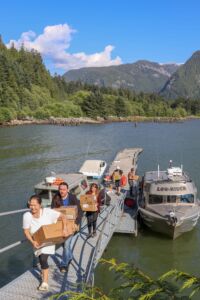
And their effort isn’t lost on customers like Cerelina Willie: “My husband and I truly appreciate having a water taxi available to the community, and the fact that they’re so friendly and accommodating and go an extra step for their customers is the icing on the cake.”
Shaw acknowledges that part of that is a business decision: “Once you make that connection with a client, just provide them the best service that you can.” But she points out that one key aspect that keeps customers coming back is Corbett’s personality. “Everybody just loves being on the boat with him. He’s trustworthy, he’s a really sociable, personable guy.” She points to a group of treeplanters who have chartered West Sea Otter to ferry them around the territory. “They’re like ‘there’s other water taxis further up north, but I’d rather be in the boat with Archie.’”
And the community repays the kindness. When the boat docks in Rivers Inlet, the whole community comes down to help unload freight, says Willie. “I’m not going there just to pick up my three boxes; everybody who goes down there helps to unload freight and carry boxes. The community effort is amazing.”
Economic Outcomes
The most substantial impact of West Sea Otter water taxi is that it provides community members a more affordable mode of transportation. “I’ve had people say that to me that they couldn’t afford the plane, but they can afford the boat,” says Shaw.
By charging a lower rate for freight than the airline, less per person for transportation, and a discounted rate for children, Shaw and Corbett are supporting financial growth for local families. The business is also helping decrease food costs within the community by lowering the cost that members have to pay to have their groceries delivered.
The business is also helping to spur the growth of entrepreneurial spirit in the small community. Coast Funds’ board of directors has approved funding for two further small businesses since the establishment of West Sea Otter.
It has also spurred economic growth within Wuikinxuv Village by purchasing fuel locally from both the Wuikinuxv Nation and Dawson’s Landing, and developed partnerships with local businesses such as a local store operated by Jennifer and Cherilyn Walkus.
Social Outcomes
Besides Shaw and Corbett, West Sea Otter’s only employee thus far is their son Lincoln who operates as a deckhand outside of school hours. Shaw says, however, that they’ll often provide extra income for community members by paying them to unload or load freight. Alternatively, they will offer a trade—a short bit of labour for free transportation.
Shaw and Corbett are hoping to soon expand their business by purchasing a second vessel, in which case they will also be able to hire another skipper to operate the boat. The addition of a second boat would increase the service available to community members, including more frequent journeys between Port Hardy and Wuikinuxv.
Cultural Outcomes
West Sea Otter is helping to reconnect community members with the Wuikinuxv territory, in a way other modes of transportation aren’t able to. For example, the business provides transportation to the local youth cultural group as they visit key sites in the territory, and allows community members greater opportunity to view marine wildlife like the many whales frequenting the waters between Rivers Inlet and Port Hardy.
The business also makes it easier for Wuikinuxv members who do live elsewhere to return to the community for cultural events, like the recently held Walkus Potlatch.
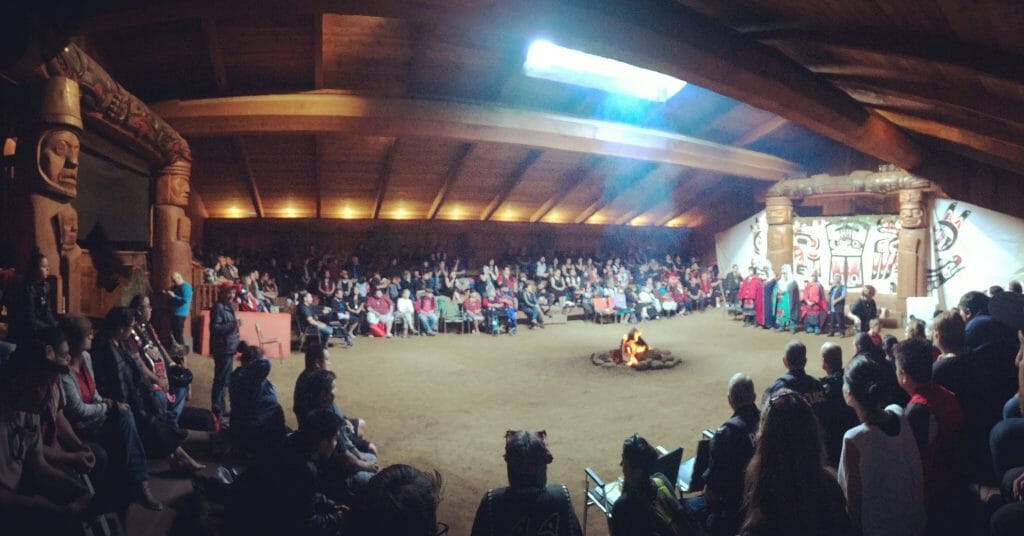
In 2016, Coast Economic Development Society approved $150,000 for the start-up of West Sea Otter Water Taxi, a new transportation company servicing the Wuikinuxv community and businesses in Rivers Inlet.
Partnerships
Online Resources
- West Sea Otter
West Sea Otter Water Taxi Website - West Sea Otter Facebook
West Sea Otter Facebook - We are the Wuikinuxv Nation
Museum of Anthropology in collaboration with Wuikinuxv Nation - Who We Are
About the Wuikinuxv Nation - Wuikinuxv Treaty
About the Wuikinuxv Treaty - Coastal Stewardship Network
Coastal Stewardship Network Website - Business Development Bank of Canada
Business Development Bank of Canada - In the Kingdom of Bears
Hakai Magazine, Oct 2018
Published On September 5, 2019 | Edited On September 10, 2019

